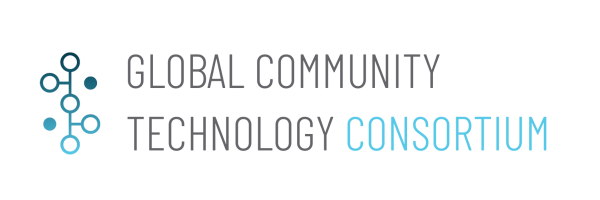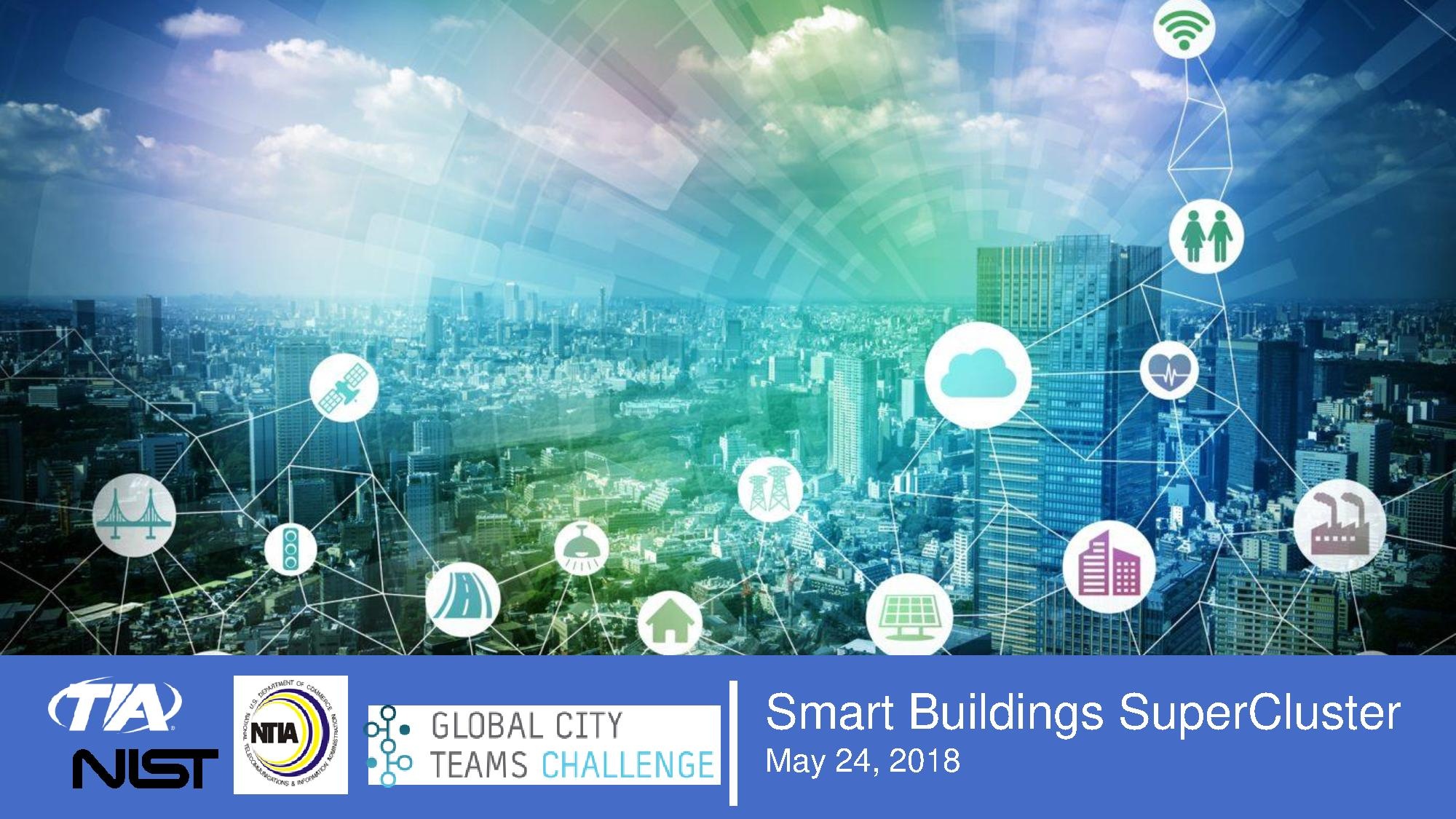Smart Buildings Action Cluster: Difference between revisions
No edit summary |
No edit summary |
||
| (3 intermediate revisions by the same user not shown) | |||
| Line 1: | Line 1: | ||
{{ActionCluster | {{ActionCluster | ||
| | |image=smart-building-1.jpeg | ||
| team | |team=NTIA, TIA | ||
| leader | |leader=Jean Rice | ||
|imagecaption=Smart Buildings & Smart Cities: Symbiotic and Integral | |||
|municipalities=San Mateo CA | |||
|status=Development | |||
|website=Website for the project. | |||
|download=100 A 3 SBAC 10 min Intro Presentation for GCTC 20June2018 (OTIA edits).pdf | |||
|description=SBAC will focus on smart buildings within the environment of communities on a local and regional level. There are a number of issues pertaining to communications, connectivity and integration that need to be resolved. This group will discuss these issues and others that arise over time, as well as work to provide best practices and prototype demonstrations of such. | |||
|challenges=SBAC will focus on 4 primary areas to start: | |||
| imagecaption | |||
| municipalities | |||
| status | |||
| website | |||
| download | |||
| description | |||
| challenges | |||
1. Interoperability of communications and applications between buildings and their environment (city, town, campus) and Security & Privacy – this will deal with cyber and physical security as well as privacy issues | 1. Interoperability of communications and applications between buildings and their environment (city, town, campus) and Security & Privacy – this will deal with cyber and physical security as well as privacy issues | ||
| Line 26: | Line 18: | ||
4. Energy – numerous issues including energy efficiency, demand by IoT applications and devices, and network infrastructure, energy generation, energy micro-grids. | 4. Energy – numerous issues including energy efficiency, demand by IoT applications and devices, and network infrastructure, energy generation, energy micro-grids. | ||
|solutions=TBD | |||
| solutions | |requirements=The approach would be as follows: | ||
| requirements | |||
1. Find testbed cities willing to offer buildings or areas of buildings (campuses, hospital, university, other) to act as testbeds. | 1. Find testbed cities willing to offer buildings or areas of buildings (campuses, hospital, university, other) to act as testbeds. | ||
| Line 39: | Line 30: | ||
5. Schedule kick-off date and first steps. | 5. Schedule kick-off date and first steps. | ||
| kpi | |kpi=The KPIs are not yet known. Here are prospective deliverables: | ||
• Interoperability best practices between a building and surrounding campus/community/city. | • Interoperability best practices between a building and surrounding campus/community/city. | ||
• Best practices for energy management among and between buildings in a sample micro/nano grid. | • Best practices for energy management among and between buildings in a sample micro/nano grid. | ||
| Line 45: | Line 36: | ||
• Paper on IoT enabled buildings’ power needs. | • Paper on IoT enabled buildings’ power needs. | ||
• Paper on the interconnection of buildings to cities regarding public and private transportation. | • Paper on the interconnection of buildings to cities regarding public and private transportation. | ||
| measurement | |measurement=TBD | ||
| standards | |standards=This cluster is focusing its first efforts on key issues that need resolution as listed both above and in the KPIs/deliverables section. We anticipate the development of guidelines, frameworks, and, if needed, standards, that will incentivize the desired behavior in the construction of smart buildings, and as a result, smart cities. For example, seamless interoperability/interconnection between a building and a city’s infrastructure is paramount, otherwise neither will be effectively “smart.” Even just choosing this as a topic, will provide invaluable guidance that can be used by the real estate industry and communities across the U.S. to support infrastructure deployment, with buildings being a key component of that infrastructure. | ||
|cybersecurity=As noted in the Interoperability focus above, cyber and physical security will be included in the areas covered. Buildings are extremely vulnerable with IoT devices proliferating an environment, many of which are not security hardened. The group will be looking at this. Physical security is also very important both with regard to intelligent access controls, and also regarding such things as edge data centers which can be located in a small office in a building. Many vulnerabilities will need to be addressed. | |||
|impacts=Anticipated project impacts: | |||
| cybersecurity | |||
| impacts | |||
* Acceleration of smart city infrastructure deployment | * Acceleration of smart city infrastructure deployment | ||
* Scalable economic development for areas of new construction and retrofit | * Scalable economic development for areas of new construction and retrofit | ||
| Line 57: | Line 45: | ||
* Increased happiness factor for tenants and citizens | * Increased happiness factor for tenants and citizens | ||
* Lower energy usage for smart buildings | * Lower energy usage for smart buildings | ||
| demonstration | |demonstration=TBD | ||
| supercluster | |chapter=Intelligent Building | ||
| year | |supercluster=Buildings | ||
|year=2018 | |||
|title=Smart Buildings Action Cluster (SBAC) | |||
|email=jrice@ntia.gov | |||
<!-- , Federal Smart Grid Task Force, NITRD Smart Cities and Communities Task Force [mailto:lschafman@tiaonline.org Limor Schafman] Senior Director, Smart Buildings Program, | |||
Telecommunications Industry Association (TIA), Co-Chair SBSC | |||
[mailto:Ronnadavis@commscope.com Ronna Davis] Strategy and Technology, Enterprise Product Management, | |||
CommScope, Inc., Co-Chair SBSC [mailto:c_bklee@smcgov.org Benny Lee] San Mateo County --> | |||
|coordinates=37°33′15″N 122°18′47″W | |||
|replicability=See above. | |||
}} | }} | ||
Latest revision as of 05:26, January 25, 2023
| Smart Buildings Action Cluster | |
|---|---|

| |
 Smart Buildings & Smart Cities: Symbiotic and Integral | |
| Team Organizations | NTIA TIA |
| Team Leaders | Jean Rice |
| Participating Municipalities | San Mateo CA |
| Status | Development |
| Document | 
|
Description
SBAC will focus on smart buildings within the environment of communities on a local and regional level. There are a number of issues pertaining to communications, connectivity and integration that need to be resolved. This group will discuss these issues and others that arise over time, as well as work to provide best practices and prototype demonstrations of such.
Challenges
SBAC will focus on 4 primary areas to start:
1. Interoperability of communications and applications between buildings and their environment (city, town, campus) and Security & Privacy – this will deal with cyber and physical security as well as privacy issues
2. Health Care- teleheath, telemedicine, smart building tech for health, interfacing with the health care community on prevention
3. Transportation – public and private transportation, connected and autonomous, applications and infrastructure
4. Energy – numerous issues including energy efficiency, demand by IoT applications and devices, and network infrastructure, energy generation, energy micro-grids.
Solutions
TBD
Major Requirements
The approach would be as follows:
1. Find testbed cities willing to offer buildings or areas of buildings (campuses, hospital, university, other) to act as testbeds.
2. Ascertain the issue(s) they want addressed which fall (ideally) within the first 4 topics listed above.
3. Determine the first project to be done in that building. Objectives, deliverables, timeline.
4. Determine the partners.
5. Schedule kick-off date and first steps.
Performance Targets
| Key Performance Indicators (KPIs) | Measurement Methods |
|---|---|
|
The KPIs are not yet known. Here are prospective deliverables: • Interoperability best practices between a building and surrounding campus/community/city. • Best practices for energy management among and between buildings in a sample micro/nano grid. • Best practices for managing integrated communications and systems within a hospital. • Paper on IoT enabled buildings’ power needs. • Paper on the interconnection of buildings to cities regarding public and private transportation. |
TBD |
Standards, Replicability, Scalability, and Sustainability
This cluster is focusing its first efforts on key issues that need resolution as listed both above and in the KPIs/deliverables section. We anticipate the development of guidelines, frameworks, and, if needed, standards, that will incentivize the desired behavior in the construction of smart buildings, and as a result, smart cities. For example, seamless interoperability/interconnection between a building and a city’s infrastructure is paramount, otherwise neither will be effectively “smart.” Even just choosing this as a topic, will provide invaluable guidance that can be used by the real estate industry and communities across the U.S. to support infrastructure deployment, with buildings being a key component of that infrastructure.
Cybersecurity and Privacy
As noted in the Interoperability focus above, cyber and physical security will be included in the areas covered. Buildings are extremely vulnerable with IoT devices proliferating an environment, many of which are not security hardened. The group will be looking at this. Physical security is also very important both with regard to intelligent access controls, and also regarding such things as edge data centers which can be located in a small office in a building. Many vulnerabilities will need to be addressed.
Impacts
Anticipated project impacts:
- Acceleration of smart city infrastructure deployment
- Scalable economic development for areas of new construction and retrofit
- Increase of businesses and jobs in the developed area
- Increased happiness factor for tenants and citizens
- Lower energy usage for smart buildings
Demonstration/Deployment
TBD